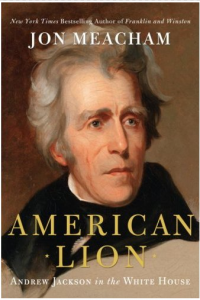 I’ll admit, I’ve been watching Jon Meacham’s biography of Andrew Jackson climbing the charts at Amazon long before it was officially published and wondering why. Yes, Meacham is a wonderful popular historian with a canny eye for stories that excite the reader’s sense of historical intimacy and drama. But Meacham is also ambitious for fame and position. He drew a bead on Walter Isaacson’s career and nailed it with one shot.
I’ll admit, I’ve been watching Jon Meacham’s biography of Andrew Jackson climbing the charts at Amazon long before it was officially published and wondering why. Yes, Meacham is a wonderful popular historian with a canny eye for stories that excite the reader’s sense of historical intimacy and drama. But Meacham is also ambitious for fame and position. He drew a bead on Walter Isaacson’s career and nailed it with one shot.
Maybe Meacham thought he could resurrect Jackson as the avatar of reformers everywhere. This was famously Arthur Schlesinger Jr.’s formulation. Read Schlesinger’s trilogy and it’s hard not to walk away with the idea that Jackson was somehow John the Baptist to Roosevelt’s Jesus. But there’s another side to Jackson that fits more with the lame duck than the President-elect. That’s a point Louis Masur makes in Slate:
In a very different spirit, Karl Rove has compared George Bush to Andrew Jackson: a man of the people who believed in providence and opposed big government. In American Lion, his new biography of the seventh president, Jon Meacham, the editor of Newsweek, dutifully wrings his hands at all the right places—at Jackson the slaveholder, Jackson the killer, Jackson the hothead—but adds his voice to the admiring chorus. Jackson was “a great general and a transformative president,” he concludes, a leader “genuinely committed to the ideal of democracy,” who was “strong and shrewd, patriotic and manipulative, clear-eyed and determined.” He was the president who, of all the early presidents, “is in many ways the most like us.”
There certainly are parallels to be drawn between the incumbent and Jackson, an imperious man who stretched the power of the presidency, flouted international law, ignored the Supreme Court, filled government positions with partisan supporters, relied on an elaborate campaign apparatus, and espoused small government while proceeding to expand its size. But that is only to say that Jackson was modern less by virtue of his principles than in his willingness to bend them when it suited his purposes. If he is a model for our times, it is not a very heroic one. Nor was Jackson in fact the decisively formative force in his own era that the hagiography suggests. As David Reynolds, who teaches at the Graduate Center of the City University of New York, demonstrates in his astute and concise history of the period, Waking Giant, the times defined Jackson as much as he defined the times. [ . . . ]
Nor was his party the catalyst of a national transformation; what is arguably more notable is how little the Democratic Party figured in the seismic shifts under way. It is telling that for all but two terms between 1828 and 1860, the Democrats controlled the presidency, but the Whigs shaped the overall direction of society. Sen. Henry Clay’s American system of banking and investment, protective tariffs, and internal improvements refashioned the nation. To be sure, the Democrats also had an impact, advancing the dogma of Manifest Destiny and encouraging Westward expansion. But it was the Whigs who rewrote American law and in the process transformed the nation’s infrastructure, making expansion possible. Jackson’s name has attached to the age, but there are many other candidates, including Clay, after whom the era might just as aptly be labeled if labels are required.
>
Source:
Downsizing Andrew Jackson
Why the Warrior President is No Hero for Our Times
LOUIS P. MASUR
Slate, November 10, 2008
http://www.slate.com/id/2204092/
American Lion: Andrew Jackson in the White House (Random House)


What's been said:
Discussions found on the web: